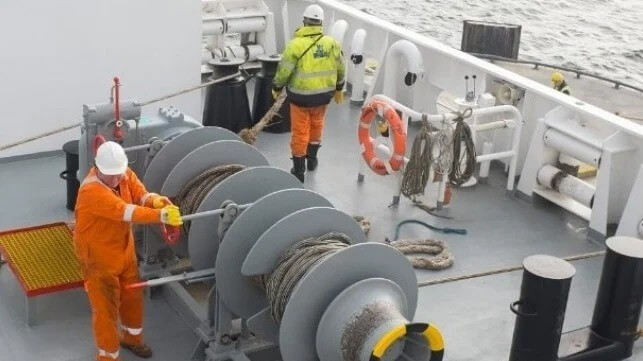Investigation Highlights Increasing Dangers to Crews of Heat Exhaustion

A newly released report into the death of a crewmember aboard a Maltese-registered bulk carrier and the hospitalization of three others in July 2023 points to the impact of climate change on crewmembers and the challenges due to their working schedule which does not provide for acclimatization. Transport Malta’s Marine Safety Investigation Unit issued the report while also warning of the need to address working conditions, training, and the potential that the situations will increase as climate change exacerbates working conditions for seafarers.
The incident occurred on July 27, 2023, when the Elpida GR, a 29,862 dwt bulk carrier that was built in 2003, was berthing at the port of Mesaieed, Qatar. As the first mooring lines were being passed ashore at approximately 0900, the bosun and two other crew members at the forward mooring station became ill and each collapsed. After the vessel was moored, the chief officer reported that he, too, was feeling unwell.
The crewmembers checked the bosun when he collapsed on deck and found that he had an abnormally high body temperature. They moved him to a shaded area, began attempting to cool his body, and then started administering cardiopulmonary resuscitation (CPR). While they were tending to the bosun, one of the ABs also collapsed at approximately 0915, and the crew observed he did not seem to be breathing. They began CPR on the AB while administering oxygen to the bosun who by that point seemed to be having trouble breathing. The situation grew more severe at 0940 when one of the ordinary seamen also collapsed.
Shoreside boats assisted in the evacuation of the crew and during that time the vessel’s chief officer reported that he was also feeling unwell. All four were evacuated with the paramedics pronouncing the bosun deceased at 1030. The cause of death was determined to be acute respiratory failure due to heat stroke, which led to cardiac arrest. The other three were all found to be suffering from heat exhaustion and related conditions.
The four were part of a crew of 21, all Filipinos, that were manning Elpida GR. The report finds that before the berthing the vessel had unloaded a cargo of bagged rice at the port Umm Qasr in Iraq, departing on July 22 in a ballast condition bound for Mesaieed, Qatar, to load a cargo of urea in bulk. During the transit, the crew was cleaning the cargo holds. The cleaning crew consisted of the bosun, deck and ordinary seafarers, and was supervised by a chief officer
The investigation found that the air temperature had been very high and that the vessel’s air condition system was unable to cope with the high temperatures. The master recalled measuring the air temperature in his cabin at 35.8 degrees C (above 96 F). Additional air conditioning was installed on the bridge and the crew was advised to drink water, take rest breaks, and rehydration salts were provided. When the incident occurred, the skies were clear, the air temperature was recorded at between 40 degrees C and 45 degrees C (104 to 113 F), and the sea temperatures were recorded at between 32 degrees C and 35 degrees C (90 to 95 F). The humidity was at 76.8 percent. Broadcasts on the radio were warning to take precautions for heat exhaustion.
The investigation concludes that the crew was likely tired and had been exposed to several days of high temperatures, possibly without taking adequate precautions. Also, the vessel’s training and procedures were incomplete for dealing with heat exhaustion and the emergency.
The fatal incident aboard Elpida GR was not isolated with the report noting a similar occurrence happened on board the Marshall Islands registered bulk carrier Barramundi in July 2021. In that instance, a bosun also died due to extreme weather conditions.
The analysis warns that because of the effects of climate change, it is likely that there may be an increase in such occurrences on board vessels, particularly when considering that crewmembers are exposed to the sun and heat due to the nature of the tasks on board. Climate change is expected to increase the frequency, duration, and intensity of heat waves, which in turn may make crewmembers more exposed to heat stroke.
Acclimatization they report notes can take several weeks. It is highly unlikely that crewmembers on board a vessel will get an opportunity to acclimatize effectively.

that matters most
Get the latest maritime news delivered to your inbox daily.
Following the incident, the operator of Elpida GR revised its safety management system manual to include a section on working in hot environments and a related checklist, together with precautionary measures to be taken. Other measures taken include how to deal with heat illnesses and raising awareness of dehydration.
The authorities issued recommendations calling for an emphasis on increased training for on-site treatment of heat stroke/hyperthermia casualties. They also recommended enhanced medical information aboard vessels, in the Seafaers’ Code, and IMO courses.
